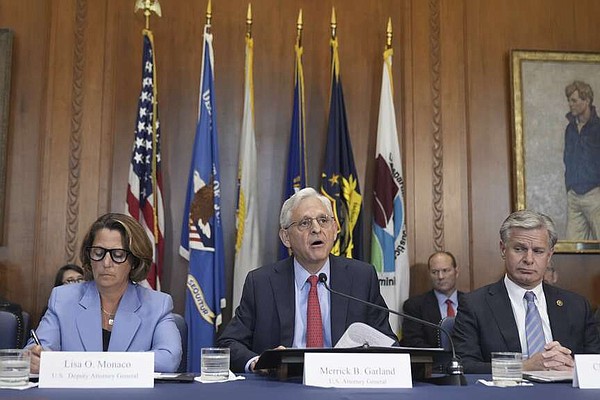WASHINGTON — The Biden administration seized Kremlin-run websites and charged two Russian state media employees in its most sweeping effort yet to push back against what it says are Russian attempts to spread disinformation ahead of the November presidential election.
The measures, which in addition to indictments also included sanctions and visa restrictions, represented a U.S. government effort just weeks before the November election to disrupt a persistent threat from Russia that American officials have long warned has the potential to sow discord and create confusion among voters. Washington has said that Moscow, which intelligence officials have said has a preference for Republican Donald Trump, remains the primary threat to elections even as the FBI continues to investigate a hack by Iran this year that targeted the presidential campaigns of both political parties.
“The Justice Department’s message is clear: We will have no tolerance for attempts by authoritarian regimes to exploit our democratic systems of government,” Attorney General Merrick Garland said.
“The American people are entitled to know when a foreign power engages in political activities or seeks to influence public discourse,” Garland continued.
One criminal case disclosed by the Justice Department accuses two employees of RT, a Russian state media company, of covertly funding a Tennessee-based content creation company with nearly $10 million to publish English-language videos on social media platforms including TikTok and YouTube with messages in favor of the Russian government’s interests and agenda, including about the war in Ukraine.
The nearly 2,000 videos posted by the company have gotten more than 16 million views on YouTube alone, prosecutors said.
The two defendants, Kostiantyn Kalashnikov and Elena Afanasyeva, are charged with conspiracy to commit money laundering and violating the Foreign Agents Registration Act. They are at large. It was not immediately clear if they had lawyers.
The Justice Department says the company did not disclose that it was funded by RT and that neither it nor its founders registered as required by law as an agent of a foreign principal.
Though the indictment does not name the company, it describes it as a Tennessee-based content creation firm with six commentators and with a website identifying itself as “a network of heterodox commentators that focus on Western political and cultural issues.”
That description exactly matches Tenet Media, an online company that hosts videos made by well-known conservative influencers Tim Pool, Benny Johnson and others.
Johnson and Pool both responded with posts on the social media platform X calling themselves “victims.” Calling Russian President Vladimir Putin a “scumbag,” Pool wrote that “should these allegations prove true, I as well as the other personalities and commentators were deceived.”
In his post, Johnson wrote that he had been asked a year ago to provide content to a “media startup.” He said his lawyers negotiated a “standard, arms length deal, which was later terminated.”
Tenet Media’s shows in recent months have featured high-profile conservative guests, including RNC co-chair Lara Trump, former Republican presidential candidate Vivek Ramaswamy and U.S. Senate candidate Kari Lake.
The Treasury Department imposed sanctions on ANO Dialog, a Russian nonprofit that helps run the Doppelgänger network, as well as the editor-in-chief of RT, Margarita Simonyan, and her deputies.
The State Department has offered a $10 million reward for information pertaining to foreign interference in a U.S. election. The department specifically said it was seeking information on a group known as Russian Angry Hackers Did It, or RaHDi.
Garland said the charges announced Wednesday were not the end of the case: “The investigation is ongoing.”
The Justice Department and the FBI have also been investigating a handful of Americans accused of knowingly spreading false Kremlin narratives. But officials have emphasized that they are not aiming to curb free speech. Americans who merely repeat or spread stories they see on Russian state media are not being investigated as part of the efforts, officials said.
DOMAINS SEIZED
In the other action, officials announced the seizure of 32 internet domains that were used by the Kremlin to spread Russian propaganda and weaken global support for Ukraine. The websites were designed to look like authentic news sites but were actually fake, with bogus social media personas designed to look like they belonged to American users.
Though the Justice Department did not identify which candidate in particular the campaign was meant to boost, internal strategy notes released Wednesday make clear that Trump and his campaign were the intended beneficiaries.
Garland said a Russian internal planning document stated that “the aim of the campaign is securing Russia’s preferred outcome in the election.”
The document, produced for the Social Design Agency, outlined plans to influence U.S. voters without identifying that the content was coming from the Russian government.
It lays out a plan to target voters in swing states, as well as voters in conservative states such as Alabama, Texas and Kansas. The document says U.S. citizens of Hispanic descent, Jews and video gamers would also be targeted.
The goal, according to the document and the indictment, was to push Americans to support the idea that the United States should focus on “addressing its domestic issues instead of wasting money in Ukraine.”
The Justice Department blocks out the names of the candidates the Russians support, but the document says that “it makes sense for Russia to put a maximum effort” into ensuring that the Republican Party’s view, and in particular the view of Trump’s supporters, “wins over U.S. public opinion.”
President Joe Biden has strongly supported Ukraine during the invasion by Russia.
Christopher Wray, the FBI director, said the fake news sites had been seized by the government as of noon.
“When we learn that adversaries overseas are trying to hide who they are and where their propaganda is coming from, as part of a campaign to deliberately sow discord, we’re going to continue to do everything we can to expose their hidden hand and disrupt their efforts,” Wray said.
Intelligence agencies have previously charged that Russia, which during the 2016 election launched a massive campaign of foreign influence and interference on Trump’s behalf, was using disinformation to try to meddle in this year’s election. The new steps show the depth of U.S. concerns and signal legal actions against those suspected of being involved.
“Today’s announcement highlights the lengths some foreign governments go to undermine American democratic institutions,” the State Department said. “But these foreign governments should also know that we will not tolerate foreign malign actors intentionally interfering and undermining free and fair elections.”
The State Department announced it was taking action against several employees of Russian state-owned media outlets, designating them as “foreign missions,” and offering a cash reward for information provided to the U.S. government about foreign election interference.
It also said it was adding media company Rossiya Segodnya and its subsidiaries RIA Novosti, RT, TV-Novosti, Ruptly, and Sputnik to its list of foreign missions. That will require them to register with the U.S. government and disclose their properties and personnel in the U.S.
In a speech last month, Deputy Attorney General Lisa Monaco said Russia remained the biggest threat to election integrity, accusing Putin and his proxies of “targeting specific voter demographics and swing-state voters in an effort to manipulate presidential and congressional election outcomes.” Russia, she said, was “intent on co-opting unwitting Americans on social media to push narratives advancing Russian interests.”
She struck a similar note last Thursday, saying at an Aspen Institute event in Washington that the foreign influence threat is more diverse and aggressive than in past years.
“More diverse and aggressive because they involve more actors from more countries than we have ever seen before, operating in a more polarized world than we have ever seen before, all fueled by more technology and accelerated by technology, like AI, and that is what we have exposed in the law enforcement actions we took today,” she said.
Much of the concern around Russia centers on cyberattacks and disinformation campaigns designed to influence the November vote. The tactics include using state media like RT to advance anti-U.S. messages and content, as well as networks of fake websites and social media accounts that amplify the claims and inject them into Americans’ online conversations. Typically, these networks seize on polarizing political topics such as immigration, crime or the war in Gaza.
In many cases, Americans may have no idea that the content they see online either originated in or was amplified by the Kremlin.
“Russia is taking a whole of government approach to influence the election, including the presidential race,” an official from the Office of the Director of National Intelligence said this summer during a briefing. The official spoke on condition of anonymity under rules worked out with that office.
Groups linked to the Kremlin are increasingly hiring marketing and communications firms within Russia to outsource some of the work of creating digital propaganda while also covering their tracks, the officials said during the briefing with reporters.
Two such firms were the subject of new U.S. sanctions announced in March. Authorities say the two Russian companies created fake websites and social media profiles to spread Kremlin disinformation.
The ultimate goal, however, is to get Americans to spread Russian disinformation without questioning its origin. People are far more likely to trust and repost information that they believe is coming from a domestic source, officials said. Fake websites designed to mimic U.S. news outlets and AI-generated social media profiles are just two methods.
Messages left with the Russian Embassy were not immediately returned.
Information for this article was contributed by Eric Tucker, David Klepper, Matthew Lee, Dan Merica, Alanna Durkin Richer, Ali Swenson and Alan Suderman of The Associated Press and by Julian E. Barnes, Glenn Thrush and Steven Lee Myers of The New York Times.
Attorney General Merrick Garland speaks during a meeting of the Justice Department’s Election Threats Task Force, at the Department of Justice, Wednesday, Sept. 4, 2024, in Washington. (AP Photo/Mark Schiefelbein)
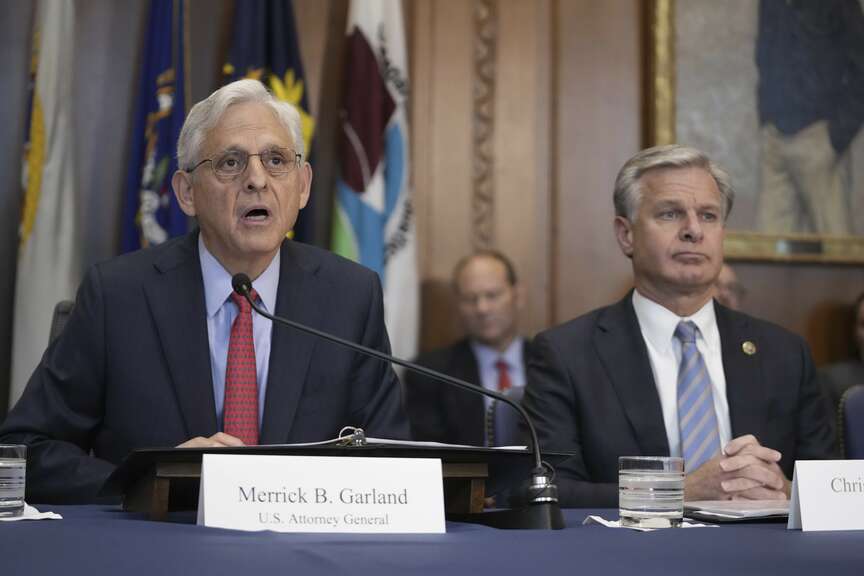 Attorney General Merrick Garland speaks during a meeting of the Justice Department’s Election Threats Task Force, at the Department of Justice, Wednesday, Sept. 4, 2024, in Washington, with FBI Director Christopher Wray, right. (AP Photo/Mark Schiefelbein)
Attorney General Merrick Garland speaks during a meeting of the Justice Department’s Election Threats Task Force, at the Department of Justice, Wednesday, Sept. 4, 2024, in Washington, with FBI Director Christopher Wray, right. (AP Photo/Mark Schiefelbein)
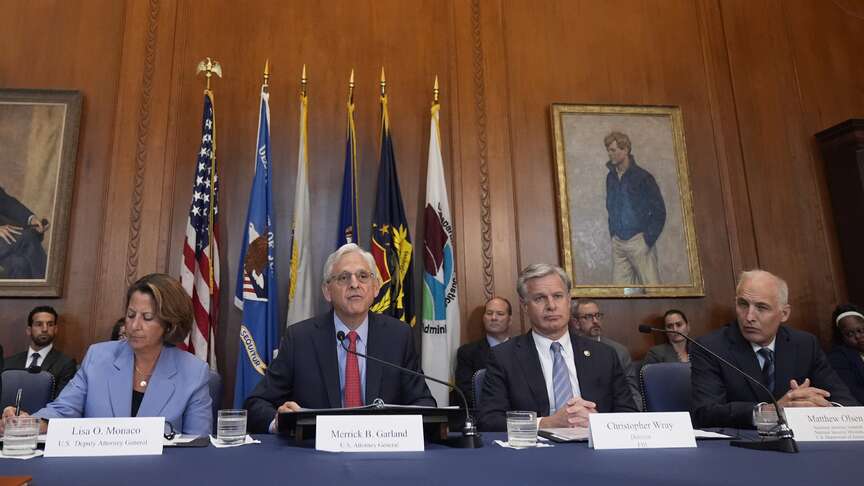 Attorney General Merrick Garland speaks before a meeting of the Justice Department’s Election Threats Task Force, at the Department of Justice, Wednesday, Sept. 4, 2024, in Washington, with Deputy Attorney General Lisa Monaco, left, FBI Director Christopher Wray, center right, and Assistant Attorney General, National Security Division, Matthew Olsen, right. (AP Photo/Mark Schiefelbein)
Attorney General Merrick Garland speaks before a meeting of the Justice Department’s Election Threats Task Force, at the Department of Justice, Wednesday, Sept. 4, 2024, in Washington, with Deputy Attorney General Lisa Monaco, left, FBI Director Christopher Wray, center right, and Assistant Attorney General, National Security Division, Matthew Olsen, right. (AP Photo/Mark Schiefelbein)
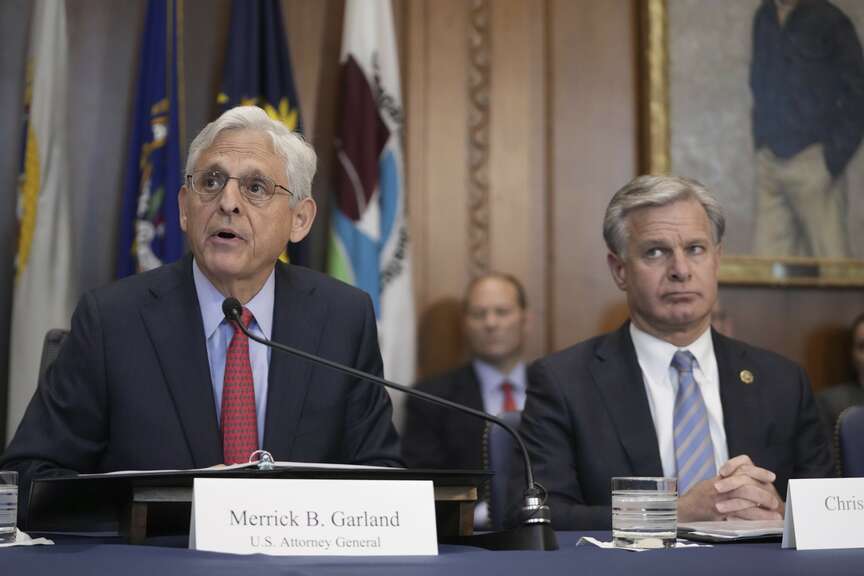 Attorney General Merrick Garland speaks during a meeting of the Justice Department’s Election Threats Task Force, at the Department of Justice, Wednesday, Sept. 4, 2024, in Washington, with FBI Director Christopher Wray, right. (AP Photo/Mark Schiefelbein)
Attorney General Merrick Garland speaks during a meeting of the Justice Department’s Election Threats Task Force, at the Department of Justice, Wednesday, Sept. 4, 2024, in Washington, with FBI Director Christopher Wray, right. (AP Photo/Mark Schiefelbein)
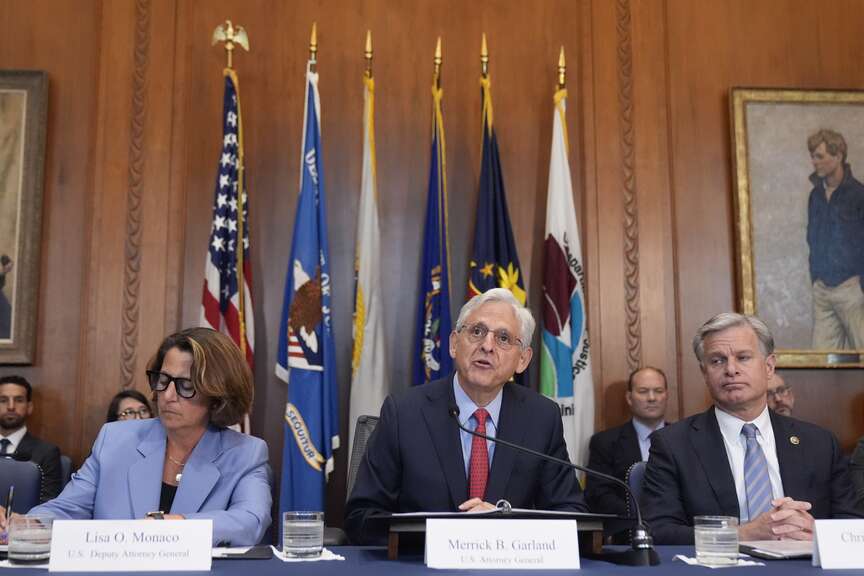 Attorney General Merrick Garland speaks during a meeting of the Justice Department’s Election Threats Task Force, at the Department of Justice, Wednesday, Sept. 4, 2024, in Washington, with Deputy Attorney General Lisa Monaco, left, and FBI Director Christopher Wray, right. (AP Photo/Mark Schiefelbein)
Attorney General Merrick Garland speaks during a meeting of the Justice Department’s Election Threats Task Force, at the Department of Justice, Wednesday, Sept. 4, 2024, in Washington, with Deputy Attorney General Lisa Monaco, left, and FBI Director Christopher Wray, right. (AP Photo/Mark Schiefelbein)
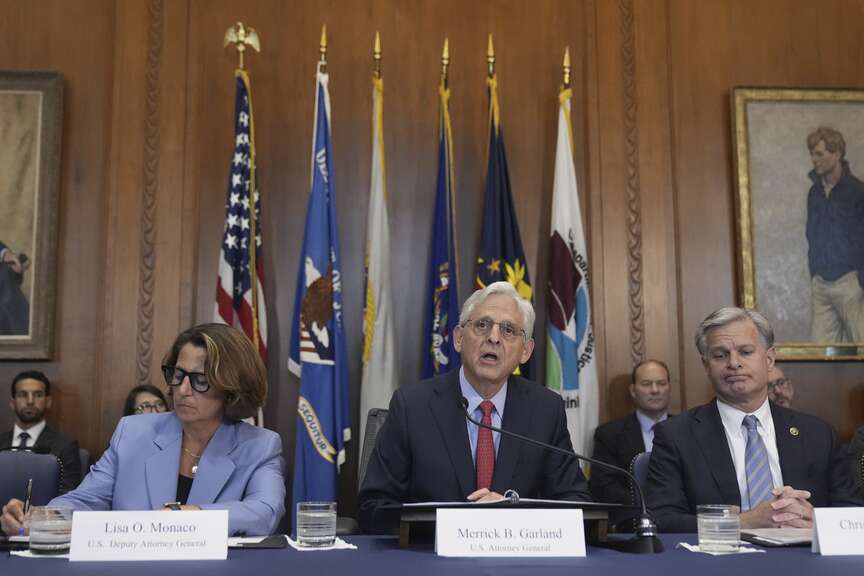 Attorney General Merrick Garland speaks during a meeting of the Justice Department’s Election Threats Task Force, at the Department of Justice, Wednesday, Sept. 4, 2024, in Washington, with Deputy Attorney General Lisa Monaco, left, and FBI Director Christopher Wray, right. (AP Photo/Mark Schiefelbein)
Attorney General Merrick Garland speaks during a meeting of the Justice Department’s Election Threats Task Force, at the Department of Justice, Wednesday, Sept. 4, 2024, in Washington, with Deputy Attorney General Lisa Monaco, left, and FBI Director Christopher Wray, right. (AP Photo/Mark Schiefelbein)
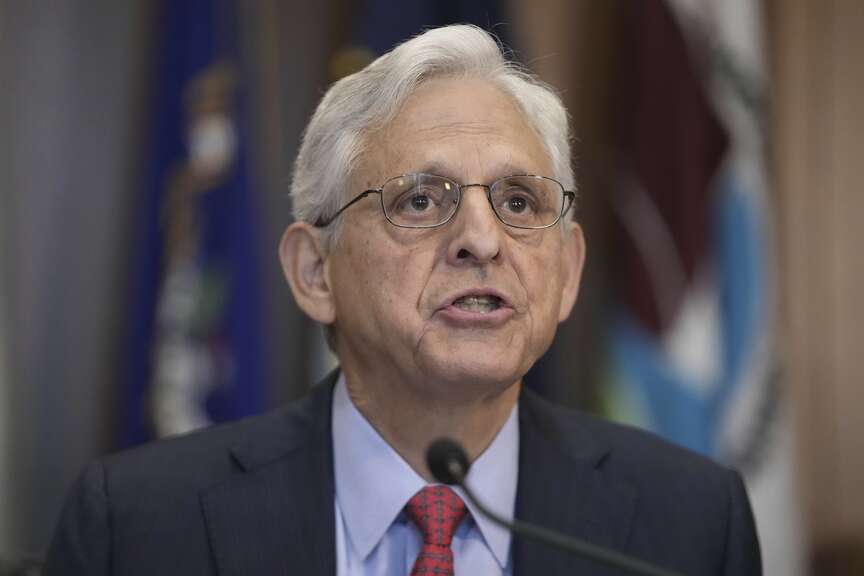 Attorney General Merrick Garland speaks during a meeting of the Justice Department’s Election Threats Task Force, at the Department of Justice, Wednesday, Sept. 4, 2024, in Washington. (AP Photo/Mark Schiefelbein)
Attorney General Merrick Garland speaks during a meeting of the Justice Department’s Election Threats Task Force, at the Department of Justice, Wednesday, Sept. 4, 2024, in Washington. (AP Photo/Mark Schiefelbein)
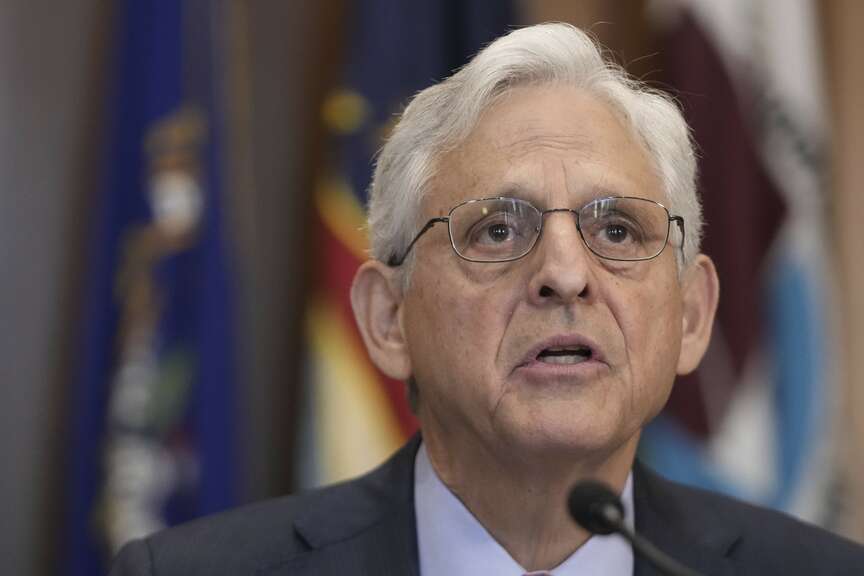 Attorney General Merrick Garland speaks during a meeting of the Justice Department’s Election Threats Task Force, at the Department of Justice, Wednesday, Sept. 4, 2024, in Washington. (AP Photo/Mark Schiefelbein)
Attorney General Merrick Garland speaks during a meeting of the Justice Department’s Election Threats Task Force, at the Department of Justice, Wednesday, Sept. 4, 2024, in Washington. (AP Photo/Mark Schiefelbein)
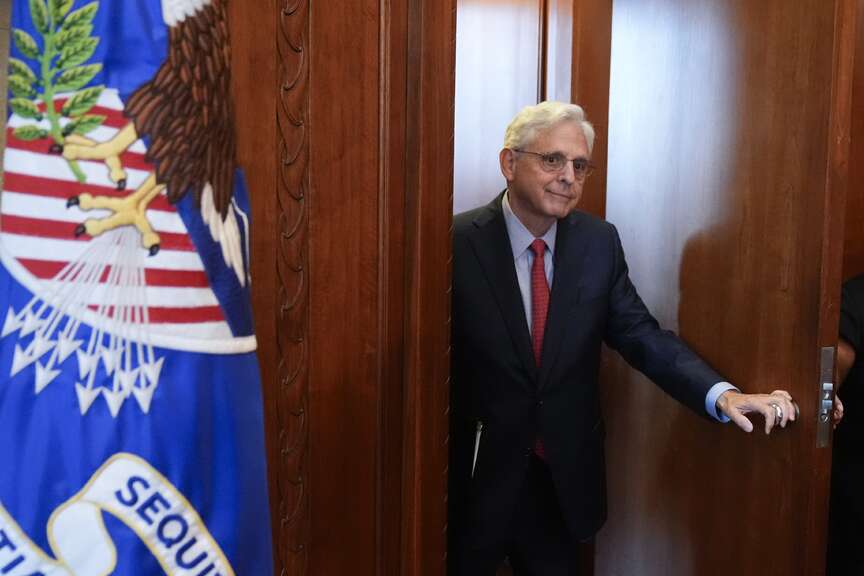 Attorney General Merrick Garland arrives for a meeting of the Justice Department’s Election Threats Task Force at the Department of Justice, Wednesday, Sept. 4, 2024, in Washington. (AP Photo/Mark Schiefelbein)
Attorney General Merrick Garland arrives for a meeting of the Justice Department’s Election Threats Task Force at the Department of Justice, Wednesday, Sept. 4, 2024, in Washington. (AP Photo/Mark Schiefelbein)

